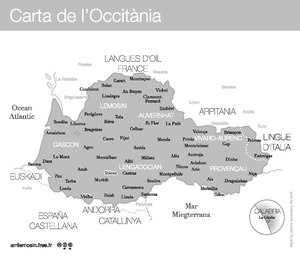
Back Usitanyo ACE Occitania AN أوكستانيا Arabic اوسيتانى ARZ Occitania (rexón cultural) AST Oksitaniya (tarixi vilayət) Azerbaijani Аксітанія Byelorussian Аксытанія BE-X-OLD Okitania Breton Occitània Catalan
Occitania
Occitània | |
|---|---|
Nation | |
 | |
| Etymology: Oc (yes in Occitan) + "itania" from Aquitania | |
| Anthem: Se Canta (Occitan) "If it sings" | |
 Linguistic map of Occitania (ca. 1900) | |
| Coordinates: 44°18′00″N 2°52′41″E / 44.3000°N 2.8781°E | |
| Continent | Europe |
| Area | |
| • Total | 198,113 km2 (76,492 sq mi) |
| Population | |
| • Total | 16.1 million |

Occitania (Occitan: Occitània [utsiˈtanjɔ, uksiˈtanjɔ], locally [u(k)siˈtanjɔ], [ukʃiˈtanja] or [u(k)siˈtanja]; French: Occitanie [ɔksitani] ) is the historical region in Southern Europe where the Occitan language was historically spoken[1] and where it is sometimes used as a second language. This cultural area roughly encompasses much of the southern third of France (except the French Basque Country and French Catalonia) as well as part of Spain (Aran Valley), Monaco, and parts of Italy (Occitan Valleys).
Occitania has been recognized as a linguistic and cultural concept since the Middle Ages. The territory was united in Roman times as the Seven Provinces (Latin: Septem Provinciae[2]) and in the Early Middle Ages (Aquitanica or the Visigothic Kingdom of Toulouse,[3] or the share of Louis the Pious following Thionville divisio regnorum in 806[4]).
Currently, the region has a population of 16 million, and between 200,000–800,000[5][6] people are either native or proficient speakers of Occitan.[7] More commonly, French, Piedmontese, Catalan, Spanish and Italian are spoken. Since 2006, the Occitan language has been an official language in Catalonia, which includes the Aran Valley, where Occitan gained official status in 1990.
At the time of the Roman empire, most of Occitania was known as Aquitania.[8] The territories conquered early were known as Provincia Romana (see modern Provence), while the northern provinces of what is now France were called Gallia (Gaul). Under the late Roman empire, both Aquitania and Provincia Romana were grouped in the Seven Provinces or Viennensis. Provence and Gallia Aquitania (or Aquitanica) have been in use since medieval times for Occitania (i.e. Limousin, Auvergne, Languedoc and Gascony).
The historic Duchy of Aquitaine should not be confused with the modern French region called Aquitaine: this is a reason why the term Occitania was revived in the mid-19th century. The terms "Occitania"[9] and "Occitan language" (Occitana lingua) appeared in Latin texts from as early as 1242–1254[10] to 1290[11] and during the early 14th century; texts exist in which the area is referred indirectly as "the country of the Occitan language" (Patria Linguae Occitanae). The name Lenga d'òc was used in Italian (Lingua d'òc) by Dante in the late 13th century. The somewhat uncommon ending of the term Occitania is most likely from a French clerk who joined the òc [ɔk] and Aquitània [ɑkiˈtanjɑ] in a portmanteau term, thus blending the language and the land in just one concept.[12]
On 28 September 2016, Occitanie became the name of an administrative region that succeeded the regions of Midi-Pyrénées and Languedoc-Roussillon;[13] it is a small part of Occitania.
- ^ "The ancient language of the South France, was called, la langue d'oc, from the sound of its affirmative particle. From this circumstance, the country has been called Occitanie, and a specific portion of it, Languedoc. The French have lately formed a new adjective, Occitanique, to comprize all the dialects derived from the ancient tongue." in Sharon Turner, The history of England (during the middle ages), London, Longman, Hurst, &c. 1814. Read on GoogleBooks
- ^ Map of the Roman Empire, ca400 AD
- ^ Map of the Visigothic Kingdom
- '^ Map of the 806 divisio regnorum'. Louis' share in yellow.
- ^ Fabrice BERNISSAN (2012). "Combien l'occitan compte de locuteurs en 2012 ?", Revue de Linguistique Romane, 76 (12/2011-07/2012), pp. 467-512
- ^ « De fait, le nombre des locuteurs de l’occitan a pu être estimé par l’INED dans un premier temps à 526 000 personnes, puis à 789 000, » ("In fact, the number of occitan speakers was estimated by the French Demographics Institute at 526,000 people, then 789,000") Philippe Martel, "Qui parle occitan ?" in Langues et cité Archived 2012-03-16 at the Wayback Machine n°10, December 2007.
- ^ "World Directory of Minorities and Indigenous People". Archived from the original on 2009-04-29.
- ^ Jean-Pierre Juge (2001) Petit précis – Chronologie occitane – Histoire & civilisation, p. 14.
- ^ Joseph Anglade, Grammaire de l'ancien provençal ou ancienne langue d'oc, 1921, Part I, Chapter 1, p. 9: Le mot Langue d'Oc a d'abord désigné le pays où se parlait cette langue; c'était une expression géographique. Le pays de langue d'oc s'appelait en Latin Occitania (formé sans doute sur Aquitania) ("The words Langue d'Oc first designated the country where the language was spoken: it was a geographical expression. The land of the langue d'oc was called Occitania in Latin (probably coined from Aquitania").
- ^ Frederic Mistral, Lo Tresor dóu Felibrige (1878–1886), vol. II, p. 1171: "Les textes abondent qui montrent l'origine française ou ecclésiastique des expressions lingua occitana et Occitania. Le pape Innocent IV (1242–1254), un des premiers parle de Occitania dans ses lettres; les commissaires de Philippe le Bel qui rédigèrent l'arrêt sanè des coûtumes de Toulouse se déclarent Ad partes linguae occitanae pro reformatione patriae designati et stipulent que leur règlement est valable in tota lingua occitaniae."
- ^ Robèrt LAFONT (1986) "La nominacion indirècta dels païses", Revue des langues romanes nº2, tome XC, pp. 161–171.
- ^ Bodo MÜLLER. "Langue d'Oc, Languedoc, Occitan", in: Verba et Vocabula, Festschrift Ernst Gamillscheg, München 1968, pp. 323-342.
- ^ "Décret n° 2016-1264 du 28 septembre 2016 portant fixation du nom et du chef-lieu de la région Occitanie - Legifrance". www.legifrance.gouv.fr. Archived from the original on 2017-04-14. Retrieved 2017-04-13.
